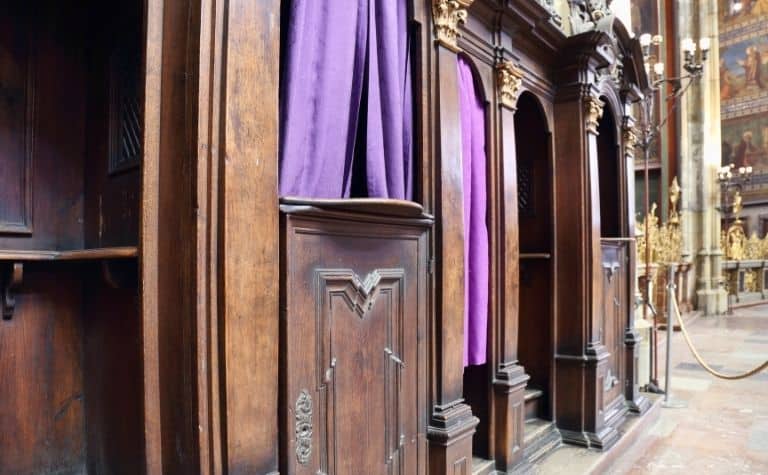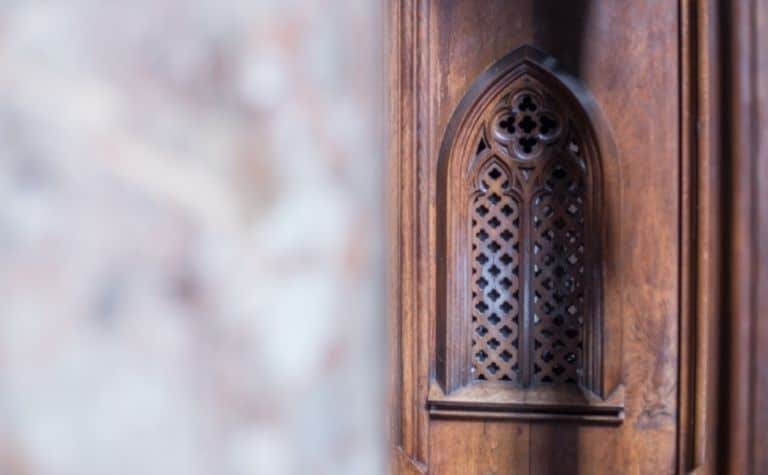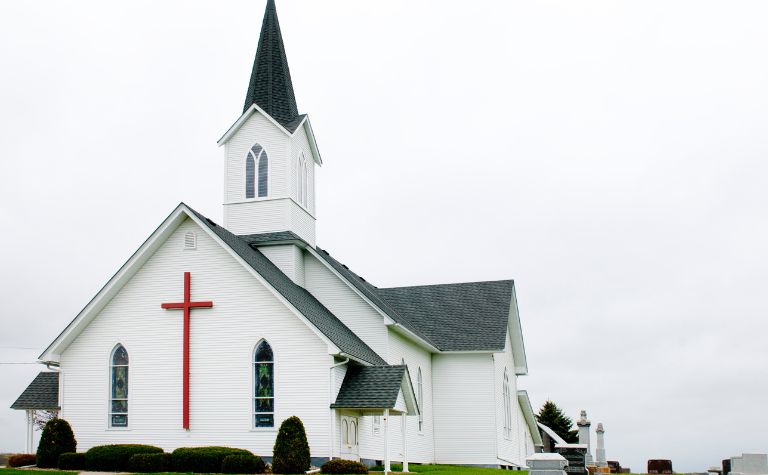Confessing sin to priests, who in turn communicate the requirements for forgiveness, is an important practice in Roman Catholicism. Many people wonder if Protestants have the same practice or a similar one.
Confessing sin to God is an important spiritual discipline in most Protestant traditions. Protestants aren’t required to confess their sins to their pastors or ministers as a requirement for forgiveness. However, they may reveal their mistakes and shortcomings when they ask others for help and support.
Why don’t Protestants confess their sins to a priest? How do Protestants interpret Bible verses that mention confessing sin to other people? Why are the examples of Stephen and Phillip, as well as other non-apostles in the book of Acts, important to the Protestant understanding of confession? Keep reading to learn the answers to these questions and others.

Why Don’t Protestants Confess Their Sins To a Priest?
First, Protestants don’t have priests per se; they commonly call their clergy pastors or ministers. Second, though Protestants may seek assistance and wisdom from their pastor or minister concerning a mistake they made or vice they have — and reveal their sin in the process — such a confession isn’t required for forgiveness from God. (Also, Did Protestants Remove Books From the Bible?)
| Catholic | Protestant | |
|---|---|---|
| What is confession? | Saying the same thing God does about sin | Saying the same thing God does about sin |
| Is confession important? | Yes | Yes |
| Is confession to clergy necessary? | Yes, at least once a year | No, but many seek the wisdom and counsel of their pastor or minister |
| Is genuine sorrow for sin important? | Yes | Yes |
| Is confession a sacrament? | Confessing sin to a priest is part of the sacrament of penance. | Protestants believe that Jesus only taught sacraments or ordinances: baptism and the Lord’s Supper. However, many Protestants consider confession a spiritual discipline. |
| Is reparation important? | Yes, this is prescribed by the priest and includes prayer, good works, and financial restitution when applicable. | Yes, specific acts, like asking another person for forgiveness or financial restitution, aren’t prescribed by clergy, though they may encourage it. |
Why don’t Protestants believe that confessing sin to a pastor or minister is important? Protestants don’t believe that the Bible mandates confessing sin to priests, pastors, or ministers. Instead, they point to Bible verses that mention people confessing sin to God directly as the best model for Christian practice.
- 1 John 1:9: ” If we confess our sins, he is faithful and just to forgive us our sins and to cleanse us from all unrighteousness.” (ESV)
- Psalm 32:5: “I acknowledged my sin to you, and I did not cover my iniquity; I said, “I will confess my transgressions to the Lord,” and you forgave the iniquity of my sin.” (ESV)
- Psalm 51:1-4: “Have mercy on me, O God, according to your steadfast love; according to your abundant mercy blot out my transgressions. Wash me thoroughly from my iniquity, and cleanse me from my sin! For I know my transgressions, and my sin is ever before me. Against you, you only, have I sinned and done what is evil in your sight, so that you may be justified in your words and blameless in your judgment. (ESV)

How Do Protestants Interpret Scripture About Confessing Sin to Other People?
Protestants acknowledge and accept the Bible’s teaching that there is wisdom in confessing sin to other people, including pastors and ministers.
For example, James 5:16 reads, “Therefore, confess your sins to one another and pray for one another, that you may be healed. The prayer of a righteous person has great power as it is working.” (ESV)
Is James 5:26 referring to Catholic confession? In the immediate context of James 5:16, the author may be referring to sins that are hindering healing, according to Protestant Bible scholars.
Or, James may have in mind confessing to people that the sin has hurt. Though the elders of the church are to provide prayer support for such people in need (5:14), there is no requirement mentioned that confession must be made to a priest. (Also, see Protestant vs. Evangelical: What’s the Difference?)
Doesn’t John 20:22-23 grant priests the power to forgive sin? After Jesus rose from the dead, he appeared to the disciples and said, “If you forgive the sins of any, they are forgiven them; if you withhold forgiveness from any, it is withheld.” (ESV)
Protestants don’t believe these verses teach that Jesus has delegated forgiveness to the church or that modern-day Catholic clergy inherited this role, passed down through the centuries, from the apostles. (Also, see Protestant vs. Anglican: What’s the Difference?)
Rather, the verses mean that the followers of Jesus preach the gospel, empowered by the Holy Spirit, which is a message that has the ability to forgive sin when people respond to it.
One scholar of John sums up the Protestant viewpoint when he writes, “There is no doubt from the context that the reference is to forgiving sins, or withholding forgiveness.”
He continues, “But though this sounds stern and harsh, it is simply the result of the preaching of the gospel, which either brings men to repent as they hear of the ready and costly forgiveness which is the gospel, and so they are left in their sins.” [1]
Did only the apostles forgive sins in the book of Acts? Protestant scholars point out that people who weren’t apostles preached the gospel message about the forgiveness of sin.
- Stephen preached the gospel, and he wasn’t an apostle (Acts 7)
- Phillip preached the gospel, and he wasn’t an apostle (Acts 8)
- The men of Cyprus and Cyrene preached the gospel, and they weren’t apostles (Acts 11)
Also, see Do Protestants Celebrate Lent?

When Did Catholic Confession Start?
Confessing sin to other people is mentioned in the Bible (see above) and taught in the early church.
For example, the Didache states, “In the church, you shall acknowledge your transgressions” (4:14), and 1 Clement states, “For it is good for a man to make confession of his trespasses rather than to harden his heart, as the heart of those was hardened who made sedition against Moses the servant of God; whose condemnation was clearly manifest” (51:3).
In the fourth century, the early church father John Chrysostom (347-407) taught that confession should occur before baptism and communion. However, the development of confession, as it’s practiced in the Catholic church today, didn’t occur until centuries later.
According to The Dictionary of the Christian Church, “Confession of sin, especially in the sense ad auriculam (“into the ear” of the priest), was a medieval development which also came to play a role in worship.”
He continues, “After the passing of frequent lay communion, and under the transformed character of penance, at the Fourth Lateran Council in 1215, confession was made minimally an annual obligation, as was receipt of the host for which it was prerequisite. As an aid to the accomplishment of this requirement, the confessional stall dates from the sixteenth century.” [2]
Also, see Protestant vs. Methodist: What’s the Difference?
References:
[1] The Gospel of St. John by John Marsh. Penguin Press. 1968. P. 641-642.
[2] The Dictionary of the Christian Church, J.D. Douglas, ed. 1974. P. 250-252.
[3] Source
[4] Source
[5] Source
Related Questions
Protestantism and Anglicanism are branches of the Christian faith that have roots in Europe. Protestantism and Anglicanism have similarities and differences with each other as well as other...
The names "Protestant" and "evangelical" both describe Christians. In some contexts, they are differentiated from each other. In other contexts, they are used as synonyms. What are the similarities...
